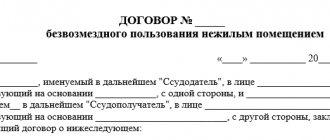Regulatory regulation
The general provisions of lease relationships and the procedure for concluding the relevant agreement are determined by Part Two of the Civil Code of the Russian Federation. The legislative act came into force after the signing of No. 14-FZ (dated January 26, 1996). The current version of the document was adopted on March 9, 2021, as amended by the Resolution of the Constitutional Court of the Russian Federation dated July 8 of this year.
Chapter 34 of the Civil Code of the Russian Federation deals directly with rent. Its individual paragraphs - from the first to the sixth - concern the features of lease relations in relation to various objects, including vehicles, buildings and structures, enterprises, as well as the so-called financial lease.
Concept and content of property rights
1.
It is necessary to distinguish between property as an economic category and property rights.
Property as an economic category
characterizes relations in society between subjects regarding material goods that are necessary for the existence of any society. These are certain economic relations that are subject to legal formalization.
Ownership
is the most important property right.
Like any property right, it is absolute
, since the owner (authorized person) is precisely known, all other persons act as obligors in relation to the owner. Along with other features of a property right, property rights are characterized by such a feature as an indefinite nature.
2. In an objective sense
ownership is a set of legal norms governing relations regarding the appropriation and ownership of material goods to a certain person or persons, the exercise by the owner of the powers of ownership, use and disposal of a thing by his own will and in his own interest, regardless of other persons.
In a subjective sense
The right of ownership is the legally enforceable ability of the owner to own, use and dispose of the thing belonging to him.
The powers of possession, use and disposal belonging to the owner of a thing constitute the content
property rights (Article 209 of the Civil Code).
3.
The right of
possession
is the legally secured ability of the owner to possess a thing, to have it physically, to dominate over it.
The right of possession must be distinguished from the actual possession of a thing. The owner of a thing can transfer it into the possession of another person, for example, rent it out. Such ownership will also be legal, since it is based on a certain legal basis - title. Possession of a thing not based on a specific title should be considered illegal.
Right of use
- this is a legally secured possibility of extracting its useful properties from a thing. The owner of a thing exercises the right to use the thing, taking into account its specific consumer properties. The owner of a thing can use it for his own interests. Thus, the owner wears clothes, eats food, and lives in residential premises that belong to him. The owner can transfer the thing for use to other persons. So, in accordance with Art. 30 of the Housing Code, the owner of a residential premises has the right to transfer it for use to other persons on the basis of a rental agreement, free use or on other legal grounds.
Power of order
- this is a legally secured opportunity to determine the legal fate of a thing. The owner can exercise the power to dispose of a thing belonging to him by performing both legal and actual actions. Legally significant actions (legal acts) include the execution by the owner of transactions aimed at alienating a thing, such as, for example, purchase and sale, donation. If the owner destroys a thing, then this also means determining the fate of the thing. The destruction of a thing during its consumption terminates the legal relationship of ownership.
The right to dispose of a thing may also belong to the non-owner. So, in accordance with Art. 76 of the Housing Code, the tenant of a residential premises under a social tenancy agreement, with the consent of the landlord and family members living together with him, has the right to transfer it for temporary use under a sublease agreement. But the non-owner is never given the right to dispose of the thing in full.
4.
The current legislation, having granted the owner these powers, also establishes the limits of their exercise. The limits of property rights are the boundaries established by law for the exercise of property rights: “The limits are objective in the sense that they do not depend on the will of the owner and other persons, but are provided for by law... no legal system can do without the proclamation of general rules and the establishment of exceptions to these rules." For example, in accordance with Art. 30 of the Housing Code, the limits of the exercise of ownership of residential premises include the need to use it only for its intended purpose, the inadmissibility of mismanagement of residential premises, the need to respect the rights and legitimate interests of neighbors, the rules for the use of residential premises, the rules for maintaining the common property of the owners of premises in an apartment building. The owner of a land plot can sell it, donate it, pledge it and dispose of it in any other way insofar as the relevant lands are not excluded from circulation on the basis of the law or are not limited in circulation (Article 260 of the Civil Code). The owner of especially valuable and state-protected cultural assets must not allow mismanagement of them, which may threaten them with the loss of their purpose (Article 240 of the Civil Code). The owner of pets must not treat them in clear contradiction with the rules established by law and the norms of humane treatment accepted in society (Article 241 of the Civil Code). Violations by the owner of the established boundaries of the exercise of property rights entail negative consequences for him, including sometimes in the form of forced termination of property rights (Articles 240, 241, 293 of the Civil Code).
5.
restrictions on the right of
ownership from the limits of the exercise of . In both cases we are talking about certain boundaries of property rights, but the nature of these boundaries differs. If limits represent objective boundaries, then restrictions on property rights are subjective. They depend on the will of the subjects themselves or the judiciary. Contractual restrictions, i.e. depending on the will of the owner, occur in cases where the latter has transferred things into possession and (or) use to another entity, for example, for rent (Article 606 of the Civil Code). The owner of a residential premises, having moved a citizen into it as a member of his family, limits himself in exercising the right to use the residential premises (Article 31 of the Housing Code). Judicial restrictions are established on the basis of a relevant judicial act in the event of a dispute.
6.
The law gives the owner not only the scope of these powers, but also places on him
the burden of maintaining
the thing belonging to him and places on him
the risk of accidental death
or accidental damage to property, unless otherwise provided by law or contract (Articles 210, 211 of the Civil Code).
Under the burden of maintenance
property should be understood as the owner’s obligation to maintain it in proper, serviceable, safe and suitable for use in accordance with the purpose of the property. This burden, as an inevitable necessity associated with the possession and use of a thing, is directly tied to the right of ownership and follows it. The norm that places the burden of maintaining a thing on the owner is dispositive. Thus, as a general rule, when transferring property for rent, the lessor is obliged to carry out major repairs of the thing, and the tenant - current, unless otherwise provided by law or agreement (Article 616 of the Civil Code). Quite rarely, the discretion of the parties to an agreement regarding the content of a thing is limited by mandatory norms. In a social rental agreement for residential premises, the obligation to carry out major repairs of residential premises is always the responsibility of the landlord; the tenant must carry out its current repairs (Articles 65, 67 of the Housing Code). In a rental agreement, the responsibility of the lessor is to carry out both major and current repairs of the thing (Article 631 of the Civil Code).
At risk
In civil law, we understand adverse consequences caused by circumstances for which no one is responsible, when there is no one’s fault in the death or damage to property. Since the owner of a thing bears the risk of its accidental loss or damage, it is the owner himself who is the person most interested in using the thing wisely and prudently and taking all necessary measures to ensure its safety. Article 211 of the Civil Code, which imposes on the owner the risk of accidental loss or damage to a thing, is dispositive in nature. The law or agreement may provide otherwise. Yes, Art. 696 of the Civil Code establishes that the risk of accidental loss or damage to a thing transferred for use under an agreement for the gratuitous use of property passes to the borrower in several cases, in particular if the thing was transferred by him to another person without the consent of the lender.
The difference between use and ownership - in general and in relation to renting
In the vast majority of cases, rent is the right to use and own at the same time. Enabling the latter means the ability to determine the conditions of access to an object, regardless of its functional purpose. Therefore, the rule applies to any real estate, including a building, structure or separate non-residential premises.
Temporary possession and use is the most common form of rental relations. Especially when it comes to commercial real estate. This situation can be explained extremely simply. Lease without ownership provides for the retention of the lessor's right to regulate access to the property. This format of cooperation can hardly be called commercially interesting in the full sense of the word, regardless of the specifics of the leased property.
It is extremely important to understand the difference between ownership and use and just use when renting. In the first case, the tenant receives the object at his full disposal, in the second, he uses its useful properties, but with very serious restrictions. The only option when such cooperation may have prospects is a clear distribution of powers and responsibilities between the tenant and the landlord. It involves the development and signing of a comprehensive lease agreement, the text of which must include all possible legal nuances, controversial situations and rules for their settlement.
Definition
Possession is a type of property right that denotes the actual possession of property. As a rule, this category is inextricably linked with the use and disposal of a thing. The right of ownership is confirmed by documents and can be limited (terminated) only on the basis of a court decision or regulatory act.
Use is a type of property right that allows a person to use an object for its intended purpose or consume it. Terminates upon expiration of the lease agreement, voluntary alienation of property, by court decision, as well as in other cases provided for by law.
How to prevent problems from arising?
Independently understanding the intricacies of domestic legislation, including the difference between temporary possession and use and only use of leased property, is an extremely difficult task. It is much easier to achieve its successful solution by involving qualified lawyers who specialize in this topic in the preparation and conclusion of the lease agreement. This approach either minimizes or even completely eliminates the risk of subsequent conflict situations, or establishes clear rules for their subsequent settlement, taking into account the interests of each party.
Comparison
To better understand the category, it is necessary to understand the triad of property rights: possession, use, disposal. They can act both together (purchase of a private house, apartment) or separately (opportunity to live in a state dormitory). At the same time, the right to use is a self-sufficient category and can exist separately from other elements of the triad. In other words, a person does not own a thing, but he freely uses it within the limits established by law or agreement.
Ownership is always associated with the other facets of the triad. It is impossible to simply possess a thing: this in itself entails the possibility of its use and (or) disposal. Thus, in the era of feudalism, land plots were subject to the right of lifelong inheritable ownership. They were passed down from generation to generation, while in reality the property actually belonged to the sovereign.
The right of use is terminated upon expiration of the contract, by a court decision or on the basis of a regulatory legal act. Possession can either be alienated voluntarily or taken away by decision of authorized bodies (usually with compensation).
Recognition of the right to use residential premises
Let us remind you that disputes regarding the use of housing are resolved exclusively in court. In this case, the court is not a magistrates’ court, but a city or district court. Such claims are considered for a state fee of 300 rubles.
The subject of the claim in such cases is either recognition of the right to use or recognition of the loss of such a right. How can such a dispute arise?
Example of a dispute
According to the social rent agreement, the citizen was provided with an apartment. After living there for some time, the citizen got married and moved his wife into the apartment, but the social tenancy agreement was not renewed. However, according to the law, a wife who moves into a municipal apartment as a family member already has the same rights as her husband. If her husband wants to evict her, or dies, she needs to go to court to defend the right to use the apartment.
A claim for recognition of the right to use residential premises is written quite simply, using this type . But if your situation is ambiguous, it is better to contact a lawyer or a competent lawyer, because each case is individual. And losing the case means losing the right to use the residential premises.
Similar articles:
- Is it possible to eject a non-owner from an apartment without consent and how to do it? To eject a non-owner from an apartment without consent in some...
- Social housing rental. Registration options Social housing rental is still in demand among…
- How long can you live without registration How long can you live without registration - this question may...
- Who is eligible and how to get social housing? Article 40 of the Constitution guarantees the provision of housing to all Russians who...
Types of land use rights
The law regulates the following types:
- Permanent (indefinite) use - now this right no longer arises, but continues to be valid for those who acquired it before the adoption of the Land Code of the Russian Federation.
- An easement is a limited use of someone else's land, arising from a contract or law under the presence of special conditions for this.
- Lifetime inheritable ownership is a right, like permanent (perpetual) use, which is no longer granted, but is available to those who acquired it earlier.
- Lease or sublease - implies the right to use a plot of land for a certain time and on a reimbursable basis.
- Urgent free use means that citizens or a legal entity can transfer their land for use for a certain time and not require payment for it. The parties enter into a corresponding agreement regarding this.
Temporary use of property
Temporary use of property is an action by which one party transfers a thing to another. The person who uses it must return it in the condition in which it was received. Although its wear and tear or condition stipulated by the relevant contract should be taken into account.
The right to use property means the right to take from it the most useful properties. As for rental relations, it must be carried out according to the terms of the concluded agreement.
Parties
Citizens and legal entities have the right to act as parties to the property transferred for temporary use. But for commercial enterprises there is a restriction on the transfer of property for the use of their property to the founders, members of the control or management body, or managers.
Property transferred for temporary use
Property can be non-consumable or individually defined. For example, real estate (enterprises, land plots, isolated natural objects, property complexes, structures, buildings, structures, etc.) meets these requirements. Although it is important to pay attention to certain points. It is important in the document to indicate information that allows you to identify the property that is to be transferred to the borrower as an object of gratuitous use. If such data is missing, the document will be considered not agreed upon by the parties.
Terms of temporary use
The term is an important condition for temporary use, since it can be definite or indefinite. If one of the parties decides to refuse use, then it is necessary to notify the other party at least one month in advance, unless the agreement provides for a different notice period.
What is land use right?
Legislative regulation of what the authority to own, dispose of and use an existing plot means is contained in the Civil and Land Codes. Analyzing the information available in them, it can be revealed that the right to use a plot of land:
- it is a right distinct from the right of ownership;
- arises from certain types of contracts;
- means that the user of a plot of land can use it at his own discretion (but according to its intended purpose), benefit from such use, fruits, etc.
How does the right of use differ from the right of ownership?
The right of ownership includes the three powers already listed above, which are granted to owners by the Constitution of the Russian Federation and are regulated by the laws already mentioned.
This:
- possession - that is, the actual possession of a land plot, which is confirmed by a certificate of ownership obtained officially;
- use is, as previously noted, the ability to use the land plot in accordance with one’s goals;
- disposal is an opportunity to determine the future future of the land plot.
In other words, the owner has the right to alienate it in any way: sell, donate, lease, bequeath to heirs, etc.
Therefore, it is not difficult to guess that with the exclusive use of land, a person is deprived of both the right of ownership (that is, he does not have documents proving this fact) and the right to dispose of it.
All that a user of a land plot has is a document on the basis of which he can use this opportunity (lease agreement, sublease, etc.) and the very opportunity to realize his needs through the use of the land provided to him, but in strict accordance with the terms of the agreement and with the provisions of the above laws.
It follows from this that the right of use differs from the right of ownership only in that it is a component of the latter.






